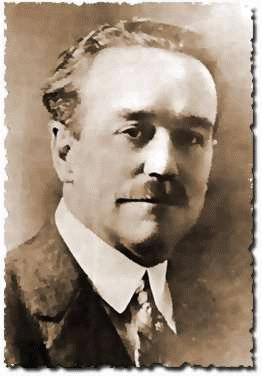Parham, Charles Fox (1873-1929)
American Pentecostal Pioneer and Founder of the Apostolic Faith Movement
 Born in Muscatine, Iowa, Parham was converted in 1886 and enrolled to prepare for ministry at Southwestern Kansas College, a Methodist institution. After three years of study and bouts of ill health, he left school to serve as a supply pastor for the Methodist Church (1893-1895). His longing for the restoration of New Testament Christianity led him into an independent ministry. Enamored with holiness theology and faith healing, he opened the Beth-el Healing Home in 1898 and the Bethel Bible School two years later in Topeka, Kansas. Parham’s theology gained new direction through the radical holiness teaching of Benjamin Hardin Irwin and Frank W. Sandfords’s belief that God would restore xenolalic tongues (i.e., known languages) in the church for missionary evangelism (Acts 2). Along with his students in January 1901, Parham prayed to receive this baptism in the Holy Spirit (a work of grace separate from conversion). In the ensuing revival, Parham and many of the students reported being baptized in the Spirit, thus forming an elite band of endtime missionaries (“the bride of Christ”), equipped with the “Bible evidence” of speaking in tongues, and empowered to evangelize the world before the imminent premillennial return of Christ. Although this experience sparked the beginning of the Pentecostal movement, discouragement soon followed. Parham’s ministry, however, rebounded. As his restorationist “Apostolic Faith” movement grew in the Midwest, he opened a Bible school in Houston, Texas, in 1905. There he influenced William J. Seymour, future leader of the significant 1906 Azusa Street revival in Los Angeles, California.
Born in Muscatine, Iowa, Parham was converted in 1886 and enrolled to prepare for ministry at Southwestern Kansas College, a Methodist institution. After three years of study and bouts of ill health, he left school to serve as a supply pastor for the Methodist Church (1893-1895). His longing for the restoration of New Testament Christianity led him into an independent ministry. Enamored with holiness theology and faith healing, he opened the Beth-el Healing Home in 1898 and the Bethel Bible School two years later in Topeka, Kansas. Parham’s theology gained new direction through the radical holiness teaching of Benjamin Hardin Irwin and Frank W. Sandfords’s belief that God would restore xenolalic tongues (i.e., known languages) in the church for missionary evangelism (Acts 2). Along with his students in January 1901, Parham prayed to receive this baptism in the Holy Spirit (a work of grace separate from conversion). In the ensuing revival, Parham and many of the students reported being baptized in the Spirit, thus forming an elite band of endtime missionaries (“the bride of Christ”), equipped with the “Bible evidence” of speaking in tongues, and empowered to evangelize the world before the imminent premillennial return of Christ. Although this experience sparked the beginning of the Pentecostal movement, discouragement soon followed. Parham’s ministry, however, rebounded. As his restorationist “Apostolic Faith” movement grew in the Midwest, he opened a Bible school in Houston, Texas, in 1905. There he influenced William J. Seymour, future leader of the significant 1906 Azusa Street revival in Los Angeles, California.
Damaged by the scandal of charges of sexual misconduct (later dropped) in San Antonio, Texas, in 1905, Parham’s leadership waned by 1907. But his linkage of tongues (later considered by most Pentecostals to be “unknown” tongues rather than foreign languages) with baptism in the Spirit became a hallmark of much Pentecostal theology and a crucial factor in the worldwide growth of the movement. In addition, the revival he led in 1906 at Zion City, Illinois, encouraged the emergence of Pentecostalism in South Africa.
A prolific writer, he edited The Apostolic Faith (1889-1929) and authored Kol Kare Bomidbar: A Voice Crying in the Wilderness (1902) and the Everlasting Gospel (c. 1919).
Gary B. McGee, “Parham, Charles Fox,” in Biographical Dictionary of Christian Missions, ed. Gerald H. Anderson (New York: Macmillan Reference USA, 1998), 515-516.
This article is reprinted from Biographical Dictionary of Christian Missions, Macmillan Reference USA, copyright © 1998 Gerald H. Anderson, by permission of Macmillan Reference USA, New York, NY. All rights reserved.
Bibliography
Digital
Parham, Charles F. Kol Kare Bomidbar: A Voice Crying in the Wilderness. Baxter Springs, KS: Apostolic Faith Bible College, 1902.
The Apostolic Faith, 1906-1908. https://ifphc.org/index.cfm?fuseaction=publicationsGuide.apostolicfaithazusa.
Parham, Charles F. The Everlasting Gospel. Baxter Springs, KS: Apostolic Faith Bible College, 1911.
Secondary
Anderson, Robert Mapes. Vision of the Disinherited: The Making of American Pentecostalism. New York: Oxford University Press, 1979.
Dayton, Donald W. Theological Roots of Pentecostalism. Grand Rapids, MI: Baker, 1987.
Gardiner, Gordon P. Out of Zion into All the World. Shippensburg, PA: Companion Press, 1990.
Goff, James R. Fields White unto Harvest: Charles F. Parham and the Missionary Origins of Pentecostalism. Fayetteville: University of Arkansas Press, 1988.
Links
“Charles F. Parham,” Institute for the Study of American Evangelicals, Wheaton College. http://www.wheaton.edu/ISAE/Hall-of-Biography/Charles-F-Parham
“Rev. Charles Fox Parham,” Apostolic Archives International Inc.
Portrait
Charles Fox Parham, Wikicommons.